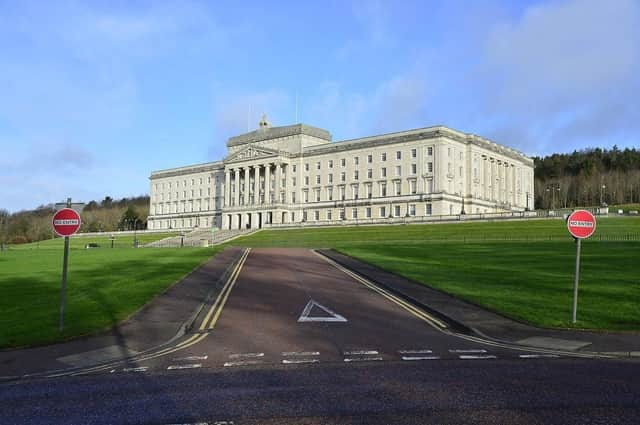Philip Smith: Much success to celebrate here so time to make NI work and drop the unionist defeatism


Firstly, that Northern Ireland’s place in the Union benefits from a functioning Stormont. Secondly, that unionism needs to present a positive argument which showcases how Northern Ireland gains from being part of the UK.
Sir Jeffrey Donaldson’s recent letter to the News Letter was echoing what Ulster Unionist leader Doug Beattie has been saying on repeat for many months: that we need a functioning Executive and Assembly, that the alternatives to devolution will not benefit Northern Ireland, and that Stormont can be a platform to grow support for the Union. As Sir Jeffrey rightly highlights, “Support for the Union was at its highest in Northern Ireland when we had fully functioning devolution.”
Advertisement
Hide AdAdvertisement
Hide AdFormer DUP leader Peter Robinson has now reinforced the consensus by stating that devolved government should be returned before the end of the year or the alternative may be direct rule with greater Dublin involvement.
When Uniting UK did a survey two years ago asking what needs to change within unionism, the main priorities for pro-Union respondents were a desire for unionism to become more positive in its approach and for its representatives to be more effective at countering pro-united Ireland arguments.
Of course, not everyone in unionism sees the benefits of devolution or is happy with any imminent return to Stormont. The TUV, elements within the DUP and some commentators see the Union as being irrevocably damaged by even an amended and reformed Windsor Framework.
They also fail to see the benefits in returning to Stormont, focusing instead on the possibility of a Sinn Féin first minister. This absolutist attitude wallows in negativity and pessimism, and their siege mentality has driven support and confidence from unionism.
Advertisement
Hide AdAdvertisement
Hide AdBob McCartney promotes staying out of Stormont as "the only unionist card left to play" (Staying out of Stormont is only card left to play against Irish unity process, November 23).
That strategy is the political equivalent of sawing off the branch that you’re sitting on.
With this attitude so vocal within unionism is it any wonder that 62% still oppose a return to Stormont? Yet this approach has undoubtedly resulted in a downward spiral for unionism. In the past few years, we have seen unionism lose votes, seats, influence, a first minister, a majority in the Assembly and largest party status. Some record!
Advertisement
Hide AdAdvertisement
Hide AdPro-border poll campaigners like Ireland’s Future only have two tunes: the inevitability of a ‘united Ireland’ and that Northern Ireland is a ‘failed entity’. A collapsed Stormont which exacerbates current economic difficulties, and makes improvement to public services almost impossible, only plays into their hands. In fact, the upcoming Westminster election has the potential for Sinn Féin to become the largest party again, with several unionist seats in real jeopardy. ‘Steady as she sinks’ cannot be allowed to be the future direction of unionism. Change is needed.
Journalists Ben Lowry and Alex Kane have both talked about the potential for realignment within unionism. But as Alex Kane says, “you can’t realign around mixed messaging and strategic contradictions.” That is why it is essential that unionism has a clear strategy that focuses on making Northern Ireland work, selling our place in the Union and winning back the thousands of former unionist voters who have moved to Alliance or no longer bother voting.
Unionism still has much to be positive about. There is no polling evidence to persuade a secretary of state to consider a border poll. The combined nationalist vote has shown no increase since 1998. Demographic change has been overstated. Northern Ireland’s standard of living is on a par with the Republic of Ireland. There is much success to celebrate here in all aspects of public life.
As Professor Peter Shirlow highlights, “In the last 5 years alone, people from, or living in, the region (Northern Ireland) have won the Turner Prize, the Booker Prize, the EU Prize for Literature, the Women’s Prize for Fiction and an Oscar.” In addition, our agri-food industry feeds 10 million people in the UK and we are a world leader in Fintech, cybersecurity, and hydrogen technology. Northern Ireland is an integral part of the UK and makes a significant contribution to national culture and wealth creation. The Union is a success, is going nowhere and is capable of attracting even more support. Yet if you listen to the ‘defeatists’ you would be forgiven if you thought that a border poll is just around the corner, the Union is doomed and Sinn Féin are on the cusp of victory.
Advertisement
Hide AdAdvertisement
Hide AdTime is ticking but unionism has an opportunity to enhance its position through a cohesive campaign that sells the benefits of the Union and highlights the major risks of any alternative.
The Queen’s University branches of the Democratic Unionist Association and the Young Unionists are advertising a debate on the future of unionism between the two main unionist party leaders. Looking at the recent statements from both, there should be more agreement than debate, with a consensus that unionism must change towards making Northern Ireland work better or defeatism will become self-fulfilling. Which would be no bad thing for unionism and Northern Ireland.
Philip Smith is co-founder of Uniting UK, a pro-Union campaign group based in Northern Ireland. The group articulates a positive vision for the Union to all who call Northern Ireland home. He is also a UUP councillor on Ards & North Down Borough Council